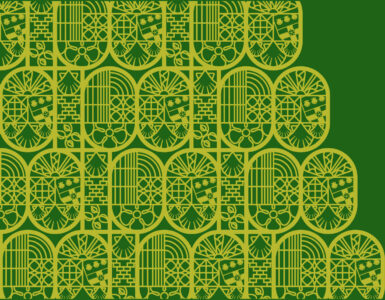University of Reading graduate Caroline Sloan is a passionate advocate for overcoming stereotypes in the workplace, and she leads by example as a female archaeology graduate working in the space sector.
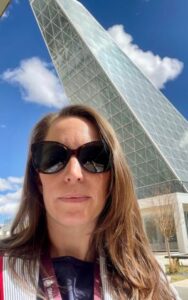
Caroline is the Head of Government Relations (UK) at Stellar Solutions Aerospace. She explained her role: “I am the primary liaison with defence and government bodies providing space-related technical and engineering advice on topics including sustainability, space debris, energy from space, launch, satellite design, and payload options. It is a wonderful place to work, led by women.
“My roles have primarily focused on the policy and negotiation that comes with managing some of the 10,000 satellites which are in orbit around our planet. I now use my expertise to advise clients, such as the UK and European Space Agencies, NASA and the Ministry of Defence.”
After studying both an undergraduate and postgraduate degree in archaeology as a mature student at Reading, Caroline shares with CONNECTED why archaeology and space is not such a surprising fit, and why the sky is NOT the limit.
Launching into space
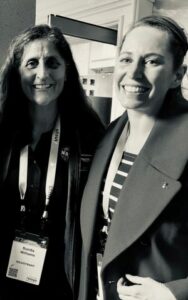
After an interesting career path of her own, Caroline champions the many different routes into the space industry.
Caroline said: “In 1999 I joined the Royal Navy and had an incredible adventure serving on HMS Scott, their largest research vessel, until I injured my back and received a medical discharge. So at the age of 23, I embarked on my studies at Reading. I have always been fascinated by archaeology which covers so many different types of evolution throughout history.
“I had a wonderful time at Reading. The students were incredibly diverse, the researchers were always happy to give advice, and the department was so supportive. I loved Reading so much that I returned to study my master’s and I still return for careers talks – as they say, Once Reading, Always Reading!”
Caroline’s career has seen her organise celebrity weddings at Cliveden House; own and operate an organic rare breeds farm in New Zealand; and work at Navy Command HQ, leading trials for the Royal Navy’s fleet of uncrewed underwater vehicles aka ‘gliders’.
Caroline said: “Gliders are temperamental autonomous systems that move slowly through the water gathering information. It’s astonishing that less than 20% of the oceans on our planet have been explored – more of our Moon and Mars have been mapped!
“I didn’t have an engineering brain and I was initially petrified that if I touched these vehicles everything was going to go wrong. But it was fun, refreshing and I learnt so much. Everyone put me at ease.
“I then worked at the National Oceanography Centre [NOC] in Southampton where I tested autonomous vehicles for underwater resilience, using the same vibration facilities that test satellites for launch. My understanding of autonomous systems enabled me to then secure a job working as a Space Policy Coordinator for the UK Ministry of Defence. Both the deep ocean and space are hostile environments so there were crossovers I could draw upon.”
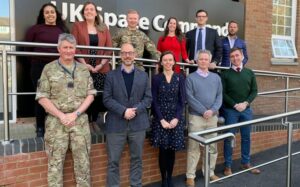
Caroline then transferred to UK Space Command where she headed up the Satellite Filing Management Team, before joining Stellar Solutions. “You have to remember – you do not have to be an astronaut to work in the space industry,” Caroline urged.
“There are many individuals who work in space but never leave the planet. They’re mathematicians, rocket scientists, engineers, communications professionals, fashion designers [Prada is designing spacesuits], cleaners, botanists, artists, accountants, and linguists.
“Without these people behind the scenes, without people with imaginations and creativity, no-one would travel into space.
“In fact, someone in the engineering team at work has a degree in knitting! They knit antenna and use that as a pattern to create the real thing. It’s bonkers, but everything is applicable to space.”
Linking archaeology
Although some might not expect it, archaeology has strong links to the study of space. Caroline explained: “The technology required to explore space is all about understanding materials and how they react in different environments. This is exactly what our ancestors did when they developed tool technologies – they had to determine which stone was most resilient and easiest to shape, and this methodology was then applied to bronze, iron, copper, tin, and steel alloys.
“My archaeology studies taught me to look at things like a puzzle. In my job today, if I’m given a task to open a spaceport, I have to look at the regulations to get the licence, the safety precautions, the impact on the area, and how people get to the remote location.
“You have to pull apart this great idea and think of the problems and risks, then put the puzzle pieces back together in a way that will work.”
Caroline shared some examples of how space technology is being used in the study of archaeology today: “Diamond Light Source, at Didcot’s Harwell Campus, is the UK’s national synchrotron – it produces a light that is 10 billion times brighter than the sun which is used to microscopically study a variety of subjects, including fossils. Similarly the ISIS facility has a ‘super-microscopic’ beam that has been used to analyse the sub-surface purity of Roman coins, discovering they were not gold or silver as originally thought.”
Overcoming stereotypes
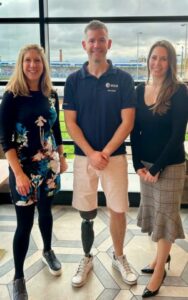
Caroline is now doing her dream job, but recognises that there unfortunately still remain many stereotypes and perceived barriers about job roles.
She said: “I have worked in predominantly male-dominated areas – motorsport, military, built environment – and I found that I had to work harder to gain the respect of my colleagues. Inclusivity in the workplace means embracing change and accepting differences. People with different perspectives often bring rejuvenation to a company.
“What matters is that you are good at your job, you are professional and you are you. I am opinionated, I am a geek, I laugh loudly, and I am on the autistic spectrum, but none of this means I fail to do my job. No-one questions my abilities because Stellar Solutions embraces individualism and quirks.”
Caroline shared her advice for those interested in working in the space sector: “Never be put off just because you don’t have a STEM background. The space sector needs a cross-section of people to make it work.
“Astronauts are always asked ‘how did you become an astronaut’ and they all answer ‘I filled in the application’. It truly is that simple – if you want to work in the space sector then go for it, there’s nothing to stop you.”
Read about some of the other inspiring women from our alumni community, or share your own story with us.



